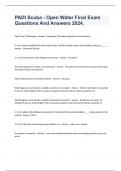Padi scuba final Study guides, Class notes & Summaries
Looking for the best study guides, study notes and summaries about Padi scuba final? On this page you'll find 186 study documents about Padi scuba final.
Page 4 out of 186 results
Sort by
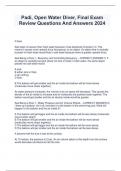
-
Padi, Open Water Diver, Final Exam Review Questions And Answers 2024
- Exam (elaborations) • 20 pages • 2024
-
Available in package deal
-
- $16.99
- + learn more
Padi, Open Water Diver, Final Exam Review Questions And Answers 2024 D float. Salt water is heavier than fresh water because it has dissolved minerals in it. This means it causes more upward force (buoyancy) on an object. An object that is neutrally buoyant in fresh water would float in salt water because there is greater upward force. See Being a Diver I - Buoyancy and Controlling Buoyancy. - CORRECT ANSWER-1) If an object is neutrally buoyant (does not sink or float) in fresh water...
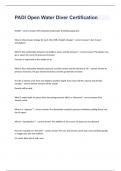
-
PADI Open Water Diver Certification Final Review Exam 2024.
- Exam (elaborations) • 17 pages • 2024
-
Available in package deal
-
- $10.99
- + learn more
PADI Open Water Diver Certification Final Review Exam 2024. SCUBA - correct answer Self contained underwater breathing apparatus What is the pressure change for each 10m/33ft of depth change? - correct answer 1 bar/1 ata/1 atmosphere What is the relationship between my depth in water and the pressure? - correct answer The deeper you go in water, the more the pressure increases Pressure is expressed as the weight of air What is the relationship between pressure, and the volume and the ...
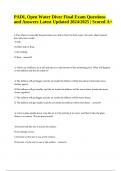
-
PADI Open Water Diver Final Exam Questions and Answers Latest Updated 2024/2025 Scored A+
- Exam (elaborations) • 22 pages • 2024
- Available in package deal
-
- $14.49
- + learn more
PADI Open Water Diver Final Exam Questions and Answers Latest Updated 2024/2025 Scored A+. If an object is neutrally buoyant (does not sink or float) in fresh water, the same object placed into salt water would A sink. B either sink or float. C do nothing. D float. - answerD 2) I blow up a balloon, tie it off, and take it to the bottom of the swimming pool. What will happen to the balloon and the air inside it? A The balloon will get bigger and the air inside the balloon will be less den...
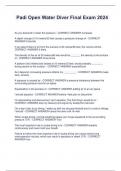
-
Padi Open Water Diver Final Exam 2024
- Exam (elaborations) • 17 pages • 2024
-
Available in package deal
-
- $16.49
- + learn more
Padi Open Water Diver Final Exam 2024 As you descend in water the pressure - CORRECT ANSWER-increases A depth change of 10 meters/33 feet causes a pressure change of - CORRECT ANSWER-2 bar/ata if you take 6 liters of air from the surface to 20 metres/66 feet, the volume will be - CORRECT ANSWER-2 liters The density of the air at 20 meters/66 feet would be _______ the density at the surface of - CORRECT ANSWER-three times A balloon fully inflated and sealed at 10 meters/33 feet, would p...

-
PADI, Open Water Diver, Final Exam Review B questions and correct aswers
- Exam (elaborations) • 20 pages • 2024
- Available in package deal
-
- $15.49
- + learn more
PADI, Open Water Diver, Final Exam Review B questions and correct aswers D float. Salt water is heavier than fresh water because it has dissolved minerals in it. This means it causes more upward force (buoyancy) on an object. An object that is neutrally buoyant in fresh water would float in salt water because there is greater upward force. See Being a Diver I - Buoyancy and Controlling Buoyancy. - ANSWERS 1) If an object is neutrally buoyant (does not sink or float) in fresh water, t...
PADI Scuba - Open Water Final Exam Questions And Answers 2024.

-
PADI Open Water Diver Final Exam with 100% Correct Answers 2024 updated
- Exam (elaborations) • 8 pages • 2024
-
- $12.99
- + learn more
PADI Open Water Diver Final Exam with 100% Correct Answers 2024 updated As a newly certified PADI Open Water Diver, I will be trained to dive with buddy as deep as - ANSWERS 18 metres/60 feet As you descend in water, the pressure - ANSWERS increases A depth change of 10 metres/33 feet causes a pressure change of - ANSWERS 1 bar/ata (atmosphere) if you take 6 liters of air from the surface to 20 metres/66 feet, the volume will be - ANSWERS 2 litres (the density of the air would be thre...
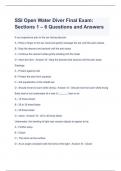
-
PADI, Open Water Diver/Scuba Diving/SSI Open Water Diver Exam Bundle
- Package deal • 34 items • 2023
-
- $38.49
- + learn more
PADI, Open Water Diver, Final Exam Review 2023 PADI Open Water Diver Final Assessment Questions with correct Answers PADI Open Water Diver PADI, Open Water Diver, Final PADI Open Water Certification Final Exam SCUBA, SSI Open Water Diver Final Exam 2023 SSI Open Water Diver Exam SSI open water dive study guide latest updated SSI final test 2023-so
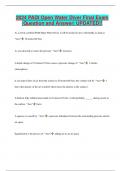
-
2024 PADI Open Water Diver Final Exam |Question and Answer| UPDATED!!
- Exam (elaborations) • 15 pages • 2024
- Available in package deal
-
- $9.49
- + learn more
2024 PADI Open Water Diver Final Exam |Question and Answer| UPDATED!! As a newly certified PADI Open Water Diver, I will be trained to dive with buddy as deep as *Ans* 18 metres/60 feet As you descend in water, the pressure *Ans* increases A depth change of 10 metres/33 feet causes a pressure change of *Ans* 1 bar/ata (atmosphere) if you take 6 liters of air from the surface to 20 metres/66 feet, the volume will be *Ans* 2 litres (the density of the air would be three times the densit...

-
PADI, Open Water Diver, Final Exam Review B questions and correct aswers
- Exam (elaborations) • 20 pages • 2024
-
- $13.99
- + learn more
PADI, Open Water Diver, Final Exam Review B questions and correct aswers D float. Salt water is heavier than fresh water because it has dissolved minerals in it. This means it causes more upward force (buoyancy) on an object. An object that is neutrally buoyant in fresh water would float in salt water because there is greater upward force. See Being a Diver I - Buoyancy and Controlling Buoyancy. - ANSWERS 1) If an object is neutrally buoyant (does not sink or float) in fresh water, t...

How much did you already spend on Stuvia? Imagine there are plenty more of you out there paying for study notes, but this time YOU are the seller. Ka-ching! Discover all about earning on Stuvia



